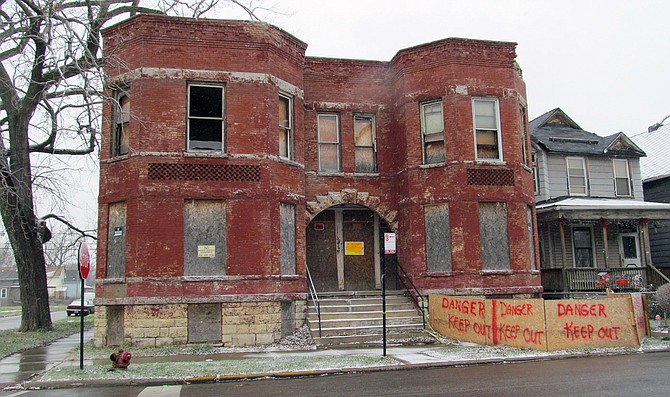Cook County Lawsuit Claims Predatory Lending Practices by Two Major Banking Institutions
Neighborhoods on Chicago’s south and west sides have numerous vacant and boarded up homes--some the result of the recent recession and some the result of predatory lending, according to Mayor Rahm Emanuel who made the comments during a recent conversation with the Chicago Citizen Newspaper.
It’s the latter, however, that resulted in lawsuits brought by Cook County Board President, Toni Preckwinkle and State’s Attorney Anita Alvarez, against HSBC, a British multinational banking and financial services company headquartered in London and Bank of America and its subsidiaries, Countrywide and Merrill Lynch, claiming that the financial institutions’ unfair lending practices, which are violations of the Fair Housing Act, resulted in the decline of the county’s property tax and other revenue loss.
“This predatory lending crisis caused tremendous tangible and intangible damage, particularly to African American and Latino communities in Cook County,” President Preckwinkle said. “These practices led to the erosion of the tax base, the loss of property tax revenue, out-of-pocket costs relating to abandoned or vacant properties, and other damages to the fabric of the communities and residents arising from the resulting urban blight.”
The County's suit, a 142; page court document, filed March 31 in U.S. District Court, Northern District of Illinois, against Bank of America and its subsidiaries, (Civil Action No.: 1:14-cv-2280) is seeking injunctive relief and monetary damages on claims that the bank’s predatory lending practices and activities, in part, led to the foreclosure crisis throughout Cook County.
“Defendants’ activities adversely impact all of Cook County, but they have had a particularly devastating effect on minority communities because predatory mortgage loans were concentrated in minority communities,” said Special Assistant State’s Attorney, Jim Evangelista, a partner with the law firm of Harris Penn Lowry, LLP which represents Cook County.
According to court documents, Bank of America and its subsidiaries, after identifying and targeting FHA protected minority borrowers using advanced data mining techniques and predictive analysis methodologies, allowed for unchecked or improper, credit approval decisions for minority borrowers that resulted in African American and Latino borrowers being approved for loans they could not afford.
Bank of America spokesperson Rich Simon released a statement saying, “Bank of America has deep ties to the Chicago and Cook County community, and we value greatly the relationships we have with our customers, businesses and institutions here...we have not had an opportunity to fully analyze this complaint, but based on similar suits that have been filed against multiple lenders in Cook County and other municipalities; we believe our record will demonstrate there is no basis for the claims.”
Lawsuit documents also point out that Bank of America has already been sued by and settled with federal regulators, including the Federal Reserve Board, the Office of the Controller of the Currency, the Federal Housing Finance Agency, various State Attorneys General and FHA protected minority borrower class action plaintiffs among others, for all the county’s actions alleged in its own lawsuit.
In terms of the role loan servicers play that lead to abandoned properties, a Woodstock Institute, (nonprofit research and policy organization in the areas of fair lending) report titled, Unresolved Foreclosures: Patterns of Zombie Properties in Cook County examined the extent to which loan servicers are walking away from Cook County foreclosures.
Zombie properties are defined as a property that has been in foreclosure for more than three years because neither the borrower nor the servicer has clear control of the property, and neither has strong incentive to assume responsibility for the property.
Of all foreclosures filed between 2008 and 2010 in Cook County, approximately 8.7 percent (more than 11,700) are zombie properties and disproportionately concentrated in lower-income communities, the study finds.
“Zombie properties will make it harder for Cook County to recover fully from the housing crisis, especially in the neighborhoods where they are concentrated” says Spencer Cowan, vice president of Woodstock Institute in a released statement.
Eleven Chicago community areas have 15 or more zombie properties per 1,000 properties eligible for conventional mortgages. Communities with the highest rates of zombie properties are Washington Park (27.42 per 1,000 mortgage able properties), Grand Boulevard (22.03), Woodlawn (19.98), Englewood (17.9), and East Garfield Park (17.35)
The county is seeking compensatory and punitive damages, attorney’s fees and other relief the court deems just and equitable.
Robert Sherman, a spokesperson for HSBC stated via email, “We have no comment on the case.”
Latest Stories
- Retired Illinois Appellate Court Justice and Member of the Glen Ellyn Area Alumnae Chapter of Delta Sigma Theta Sorority, Inc. Shelvin Louise Marie Hall Dies
- It’s That Time Again: Reviewing Your Medicare Plan Before It’s Too Late
- Exciting Breakthroughs in Alzheimer’s Research Offer New Hope for Patients
- C3 Impact Fund Seeks To Spur Growth In Underserved Communities Through Real estate
- HelloBaby Identifies Site For A Second Location
Latest Podcast
Quandra-Urban Market Exchange


